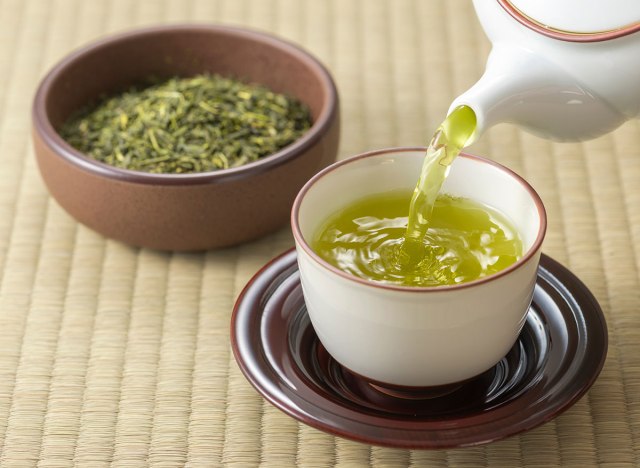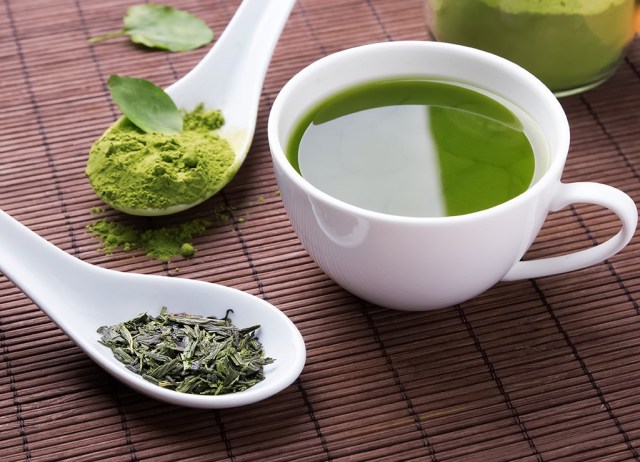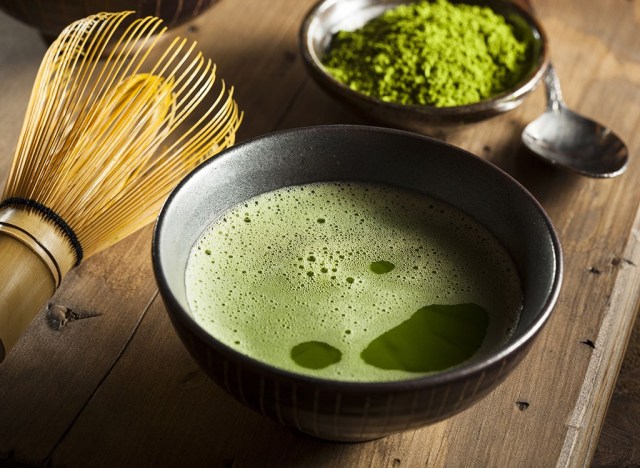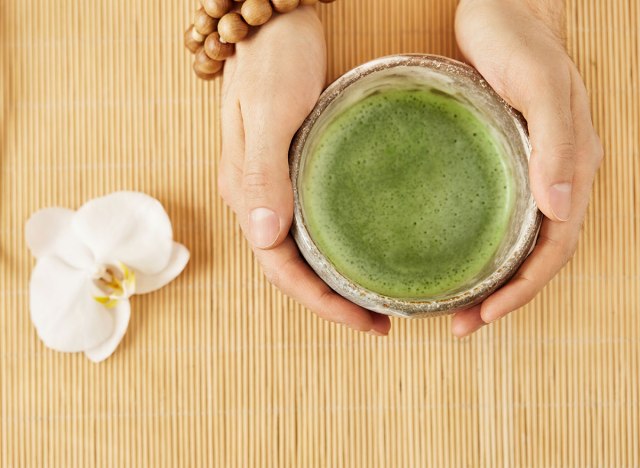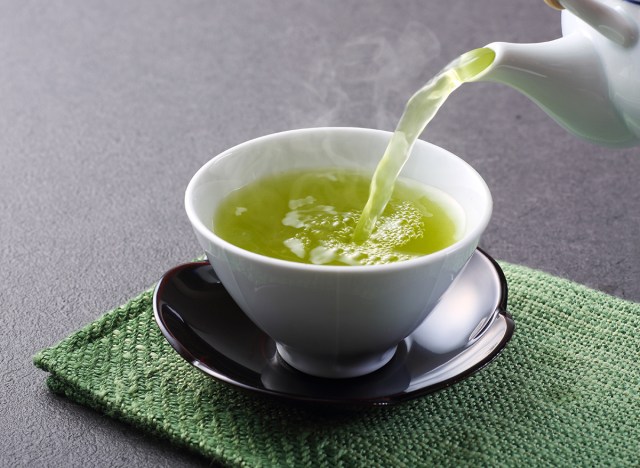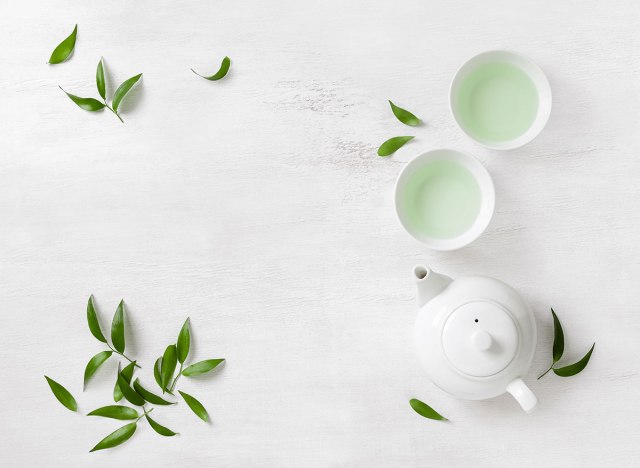What Happens To Your Body When You Drink Green Tea
Tea is one of the most popular beverages enjoyed worldwide.
Whether you enjoy green, black, or oolong, all three come from the same Camellia sinensis plant. When producing green tea, tea leaves are immediately steamed to prevent fermentation to keep the tea leaves green. For millennia, Eastern medicine has recommended green tea for its health benefits. Now, modern-day research is proving the myriad ways green tea improves health and well-being—from reducing body fat and blood sugar levels to boosting brain health. Read on for all the incredible ways drinking green tea can support your health, and for more on healthy eating, don’t miss 7 Healthiest Foods to Eat Right Now.
Green tea helps reduce the risk of developing some types of cancer.
One of the most documented benefits of green tea is its anti-cancer properties. More than 5,000 studies have been published about green tea and cancer, including human clinical trials, population-based studies, and laboratory analyses. Thousands of these studies document that green tea polyphenols and other bioactive compounds present in green tea may help prevent several types of cancer including breast, lung, colon, esophagus, mouth, stomach, small intestine, kidney, and pancreas.
According to Katherine Brooking MS, RD, a New York-based registered dietitian, “several population-based studies suggest that both green and black teas help protect against cancer. Several preliminary clinical studies suggest that the polyphenols in tea—particularly epigallocatechin gallate (EGCG)—may play an important role in the prevention of cancer. Researchers also believe that polyphenols help kill cancerous cells and they may protect healthy cells from cancer-causing hazards,” notes Brooking.
Green tea is antioxidant-rich.

As the non-fermented form of tea, green tea provides more of the beneficial catechins than either black or oolong tea, according to a review paper published in the Journal of the American College of Nutrition. Catechins are a sub-category of flavonoids that are found in high concentration naturally in the leaves of the Camellia sinensis plant. There are four main catechins in tea: epicatechin (EC), epicatechin-3-gallate (ECG), epigallocatechin (EGC), and epigallocatechin-3-gallate (EGCG). Of these catechins, EGCG and EGC are found in the highest concentration in green tea and have been the subject of most of the studies. Antioxidant catechins are also present in other healthy plant-based foods like apples, berries, and cacao.
Green tea is good for your brain.

If you’re looking for ways to keep your brain sharp as you age, consider adding green tea to your diet. In one published randomized, double-blind human clinical trial published in Journal of Medicinal Food, participants who took a daily supplement with green tea extract and L-theanine extracted from tea experienced improvements in mild cognitive impairments. In a test of attention and self-reported measure of alertness, memory improved after tea as compared to the placebo. Besides drinking green tea, you can also improve your cognitive performance with these 13 Healthy Foods That Boost Your Memory, According to Nutritionists.
Green tea helps prevent Type 2 Diabetes.

Numerous studies reveal that green tea helps reduce fasting blood sugar levels and risk for developing type 2 diabetes. Green tea also has been shown to help increase insulin sensitivity, so that the insulin your pancreas produces can more efficiently maintain normal blood sugar levels. Green tea helps protect the cells that produce insulin, and the flavonoids in tea can help mop up harmful free radicals and tamp down inflammation. These benefits are all helpful to help prevent type 2 diabetes as well as reduce complications from diabetes like diabetic retinopathy, according to a review article published in the journal Antioxidants.
Green tea is good for your heart.

Green tea is a superstar when it comes to heart health, explains Eat This, Not That! Medical Expert Board members and Manhattan-based registered dietitians Lyssie Lakatos, RDN, and Tammy Lakatos Shames, RDN, known as The Nutrition Twins. “The polyphenolic catechins found in green tea have been found to improve total and LDL (bad) cholesterol levels, which are two risk major factors for heart disease.”
In a landmark population-based study reported in JAMA with more than 40,000 Japanese adults followed for more than 11 years, the results reported that drinking more than 5 cups of green tea daily lowered the risk of death of a heart attack or stroke by 26%, compared to subjects who reported drinking less than a cup per day of green tea. Another study published in the European Journal of Preventive Cardiology found that drinking green tea three or more times a week can significantly improve your overall heart health, as can these 17 Healthy Eating Habits To Start Today, According To Our Medical Experts.
Green tea can make you more alert and help keep you calm.

While coffee provides a kick of caffeine to boost your day, the caffeine and other bioactive compounds in green tea can get you going without making you feel wired. According to registered dietitian Sarah Koszyk, MA, RDN, co-founder of MIJA and author of 365 Snacks for Every Day of the Year, “Green tea contains the amino acid, L-theanine, which provides a calm focus and works with the caffeine within green tea to provide a slow release that doesn’t cause withdrawals or spikes and crashes that one can experience from regular caffeine found in coffee.”
Green tea can provide a more relaxing experience with less dependency, compared to drinking coffee. L-theanine can also reduce anxiety by increasing the production of dopamine in the brain, thus improving one’s mental health and allowing people to unwind from stress, she adds.
READ MORE: Downsides of Drinking Coffee Every Day
Green tea boosts flavonoids in your diet.

Many of the documented health benefits of green, black, or oolong tea are linked to the flavonoids present in tea leaves. A recently published study in the journal Advances in Nutrition reported that daily flavonoid intake from tea was associated with reduced risk for death from heart disease and any cause of death.
According to Joy Dubost, PhD, RD, Head of Nutrition & Health at Lipton, “Flavonoids are naturally occurring dietary compounds in tea which have been associated with heart health. Daily consumption of at least 200-500 milligrams of flavonoids, found in 2-3 cups of tea, can help support a healthy heart as part of a diet consistent with the Dietary Guidelines for Americans.” For more ways to protect your heart, consider giving up these 5 Drinks That May Lead to a Heart Attack, According to Science.
The post What Happens To Your Body When You Drink Green Tea appeared first on .

